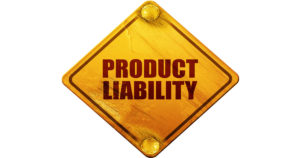CPSC Proposes Rule Banning Padded Crib Bumpers
April 28, 2020 Despite the fact that safety experts have been advocating against the manufacturing and use of padded crib bumpers because of strangulation risks for infants for years, the Consumer Product Safety Commission (CPSC) only recently began moving forward with a proposal to ban products that do not meet the agency’s airflow requirements from the market. In addition to the proposed ban, the agency is also recommending new federal legislation to require that crib liners, or thin pieces of fabric attached to crib slats, comply with certain safety standards.
Despite the fact that safety experts have been advocating against the manufacturing and use of padded crib bumpers because of strangulation risks for infants for years, the Consumer Product Safety Commission (CPSC) only recently began moving forward with a proposal to ban products that do not meet the agency’s airflow requirements from the market. In addition to the proposed ban, the agency is also recommending new federal legislation to require that crib liners, or thin pieces of fabric attached to crib slats, comply with certain safety standards.
Safe Sleeping For Infants
Crib bumpers are cotton pads that lie flush around the edges of a crib. The American Academy of Pediatrics (AAP) says there are a few ways that parents and caregivers can create a safe sleeping environment for infants. Here are some of the academy’s tips:
• Place the baby on their back on a firm surface made with a tight-fitting sheet,
• Avoid using soft bedding of any kind – which includes crib bumpers, blankets, pillows, and soft toys, and:
• Keep the crib area bare
As you can see, the AAP advises directly against the use of padded crib bumpers in a safe sleep environment. Initially, manufacturers designed crib bumpers to prevent a baby’s head from falling and getting stuck in between the crib’s slats – but that was before updated safety rules required them to place slats closer together in order to address and remedy the hazard. Today, manufacturers do not have to comply with any federal safety standards in the production of crib bumpers because they are only subject to voluntary ones. This means that crib bumpers do not have to undergo safety testing before making their way into infants’ cribs, which can – and has – had tragic, fatal consequences.
Why Crib Bumpers And Liners Are Unsafe
Both crib bumpers and crib liners increase the risk of sudden unexpected infant death. These products can cause strangulation and suffocation when a baby becomes entangled in the fabric or turns their face into the padding, restricting their breathing abilities. Most babies are not able to roll or turn over on their own until approximately 6 months of age, so becoming enmeshed in a crib bumper or liner can be deadly. According to the CPSC’s data, the number of infants that died in the seven years between 2006 and 2012 is three-times higher than the average number in the three previous seven-year periods. Additionally, hundreds of infants sustained crib bumper-related injuries, which includes near suffocation and choking, since 1985 (when the CPSC first started collecting data on the products).
All of the risks attributable to padded crib bumpers and liners are 100% preventable – but not without having updated, comprehensive federal safety guidelines in place. The CPSC’s proposal would mandate bumpers to not only meet certain airflow standards, but also would reduce their allowable thickness and add to the current firmness requirements. There is no question that the CPSC’s proposal is an extremely important and necessary one, because it would limit infant injuries and deaths that occur each year.
Manufacturers have a legal responsibility to produce and sell safe products, but all too often they put profits over people and unsafe products injure innocent consumers as a result. If a product has caused an injury due to an unsafe design, a manufacturing defect, or the failure to provider proper instructions, you can file a products liability claim. To learn more, contact a representative who can help online now.
Philadelphia Products Liability Lawyers at Galfand Berger, LLP Representing Injured Victims Since 1947
With offices located in Philadelphia, Bethlehem, Lancaster, and Reading, Galfand Berger serves clients throughout Pennsylvania and New Jersey. To schedule a consultation, call us at 800-222-8792 or complete our online contact form.
 Google Screened
Google Screened
